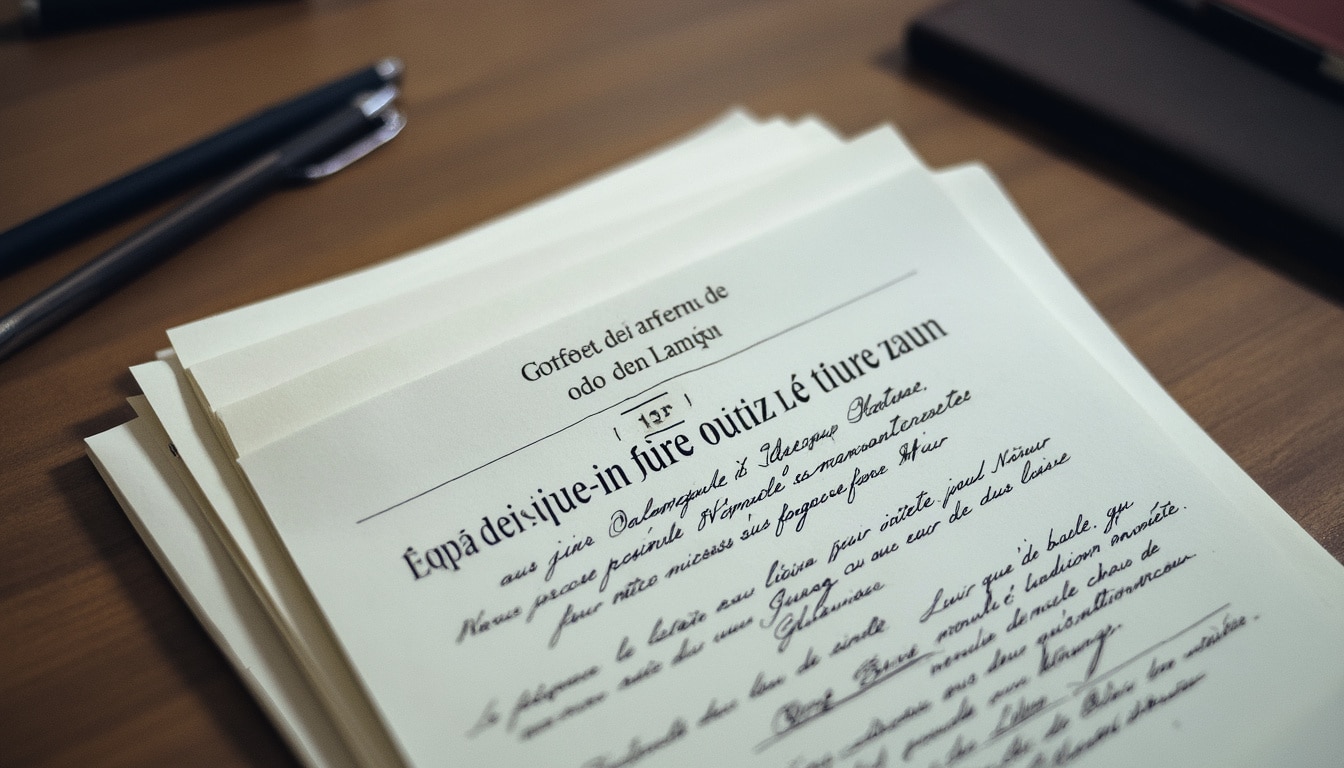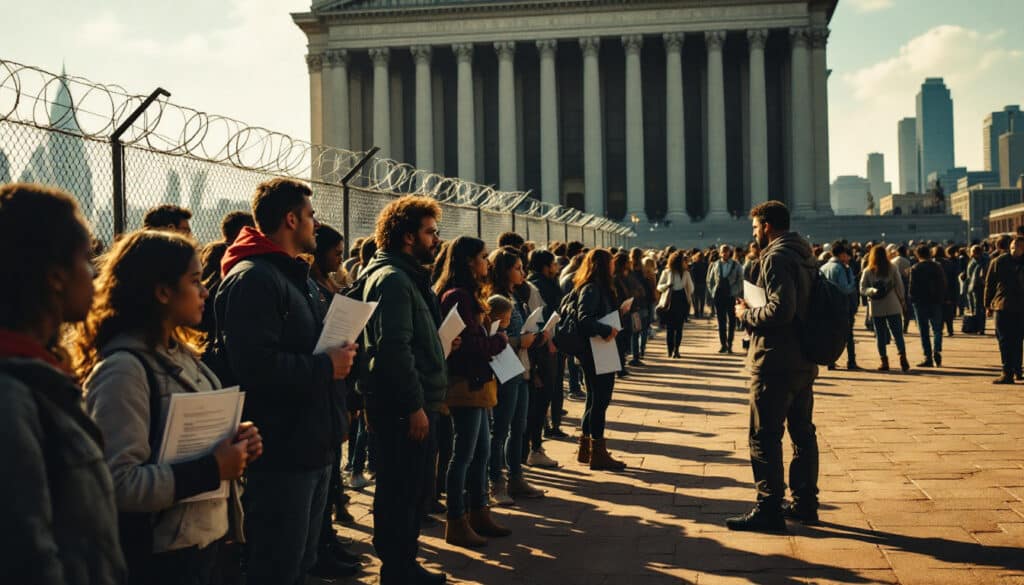Many foreign nationals wonder about the possibility of applying for a new residence permit after receiving an OQTF, sometimes fearing that they will never be able to regularize their status. The administrative maze can seem insurmountable, but there are legal pathways and practical tips that deserve your attention. Specialized associations often provide crucial support, guiding step by step those who find themselves facing the complexity of the procedures. In 2025, the evolution of the texts allowed for the expansion of certain conditions for obtaining residence permits, although the criteria remain demanding. Experiences and testimonies reveal that legal assistance is sometimes indispensable. The horizon may seem dark, but concrete solutions remain accessible to those who know to knock on the right doors. This analysis highlights the techniques, strategies, and best practices to illuminate your journey.
Understanding the impact of an OQTF and the possibility of a new residence permit
People affected by a Obligation to Leave French Territory often find themselves in a thorny situation. This administrative measure, also abbreviated as OQTF, materializes a decision for removal that requires the foreign national to leave France within a specified timeframe. The Code of Entry and Stay of Foreign Nationals mainly provides for a voluntary departure period of 30 days, but certain OQTFs are issued without delay when the prefecture believes there is a risk of flight or a serious threat to public order. The primary objective of this measure is to regulate the presence of individuals whose residence permits have expired, who have had their regularization requests rejected, or who find themselves in a so-called “irregular” situation.
It is common to wonder if obtaining a residence permit is still feasible after the notification of an OQTF. Prefecture services have the authority to make this decision, but the law does not preclude new applications under certain conditions. For instance, some families manage to regularize their situation by highlighting their family ties or their professional background. Statistics from 2022 show that out of more than 130,000 OQTFs issued, only 12% were implemented. The reasons for non-compliance can vary greatly: successful legal appeals, delicate health conditions, family protection, or interventions from associations like France Terre d’Asile, La Cimade, or GISTI. These organizations regularly work to inform and defend the rights of foreigners facing administrative precariousness.
Concrete examples show that a new residence permit can be granted if the authorities believe that the personal situation justifies a change in decision. This could involve a well-established marital life with a French citizen, the education of minor children who are continuing their schooling, or a solid employment contract justifying exceptional admission. Certain particular cases, such as the need for medical care, also have favorable outcomes. Resources exist to detail these specific aspects, as proposed by the site guide-immigration.fr/titre-sejour-pour-soins-etes-vous-concerne-par-ces-affections/, which explains the required conditions for this type of authorization.
In order to submit a solid application, it is important to gather concrete evidence, such as rental leases in the names of both spouses, invoices proving cohabitation, or attestations written by neighbors. In some cases, official letters from a doctor indicating a serious illness requiring regular follow-up in France can also play a crucial role. Organizations like SOS Racisme, ADDE, or FASILD often guide individuals seeking verified information, while the Human Rights League and UNHCR France frequently act as guarantors of the rights of foreigners.
The essential issue lies in understanding the rules surrounding the end of an OQTF. Several foreign nationals mistakenly believe that any OQTF issued definitively closes the doors to regularization. In reality, the OQTF generally expires one year after notification, when no execution has taken place and no appeal prolongs it. This is an interesting window to consider a new residence permit application, especially if new elements have emerged: marriage, an indefinite employment contract, or a child born on French soil. Based on this, some couples recall the experience of a relative who, after receiving three consecutive OQTFs, finally obtained a “Private and Family Life” permit, as explained in a detailed article on observalgerie.com.
To better understand these questions, various specialized sites offer free or paid resources. The link justifit.fr/b/guides/droit-etrangers/oqtf-et-titre-de-sejour clearly illustrates how a refusal of a residence permit most often leads to an obligation to leave the territory. Lawyers there explain the different contestation strategies. This same site mentions the types of residence permits that may be issued in cases of urgent humanitarian situations or proven professional integration. Meanwhile, the platform juriscore.legalprod.com demonstrates, through practical cases, the usefulness of preparing an extremely comprehensive file to convince the administrative authorities.
By addressing all these dimensions, a coherent action plan can be put in place. It is crucial to understand the precise reasons for the OQTF: refusal to issue or renew a title, absence of entry visa or threat to public order. A careful rereading of the notification communicated by the prefecture is essential to determine possibilities for appeal, as the appeal deadline is generally very short. Advocacy associations such as ANEF or Pacte de solidarité sometimes offer voluntary support, directing individuals to specialized lawyers. In preparing these applications, getting closer to support services, such as those from La Cimade, is a definite advantage for building a solid argument.
Ultimately, obtaining a new residence permit is far from impossible, even after an OQTF. Examples of determined couples, employees, or courageous students abound. Administrative decisions are based on a strict legal framework, but they can be revised when new facts are convincing. The link franceformalites.legal provides insights into the nuances of the residence permit application following an OQTF, while the official site service-public.fr verifies the legal compliance of these procedures. Once an OQTF no longer completely blocks the procedures, the key is to persevere, to educate oneself, and to systematically gather documents demonstrating a thorough integration.
A first section often ends with questions: “Must one absolutely leave France before reapplying?” or “How to know if the old OQTF is already prescribed?” The variety of situations means there is not a single answer. However, testimonies converge: once the validity of the OQTF has expired or the appeal has been won, new steps can lead to a favorable outcome. It is then pertinent to examine in more detail the steps of a legal appeal before considering a new title.

Appeals, deadlines, and strategies for undertaking new applications
When an obligation to leave the territory is pronounced, time proves valuable. The deadlines for action are often very short and vary depending on the circumstances: 48 hours in detention, 15 days in certain cases, or 30 days in other situations. This time constraint pushes many applicants to seek legal support immediately. The branches of La Cimade, GISTI, or France Terre d’Asile become invaluable in these moments. Do not forget the possibility of turning to a lawyer or exploring the information available on portals like guide-immigration.fr, which offers various articles dedicated to exercising a professional activity in France under a receipt.
From a legal standpoint, a first reflex is to file an amicable appeal with the prefecture responsible for the decision, highlighting elements that may not have been properly examined: a marital relationship in France, the presence of school-aged children, a job offer, or a health condition requiring social and medical follow-up. Detailed resources on the link ambacamparis.fr outline the most relevant arguments to make, as well as the specific conditions governing each reason.
If the administration refuses to reconsider its position, a contentious appeal may be brought before the competent administrative court. During this procedure, each supporting document must be duly classified and commented on. The file is strengthened if it includes morality attestations, medical reports, school certificates, or supporting documents such as joint invoices. According to the interviewed lawyers, the success rate varies between 30% and 45% for foreigners who can prove stable family or economic ties. Statistics from ADDE and the Human Rights League notably confirm that a high-quality appeal has a real chance of persuading the judge. It is important to note that if the refusal decision is maintained nonetheless, the foreign national must consider leaving the territory, under the threat of detention or a return ban lasting from one to several years.
Subsequently, the question arises: what happens after the legal expiration of the OQTF or the failure of an appeal? According to the regulations in force in 2025, a new application for a residence permit may be made when the OQTF is no longer valid. Testimonials are specifically found on the platform versailles-tribunal-administratif.fr, which mentions various jurisdictions approving the grant of new residency permits after the legal deadline has elapsed. Of course, this prospect is not automatic: proving that the personal situation has changed remains necessary. Several couples illustrate how they had to justify a stable cohabitation, with joint bills over several months, in order to request a “Private and Family Life” residence permit. Some employees, for their part, have demonstrated an uninterrupted professional commitment, supported by payslips and a tax return.
It is precisely this accumulation of evidence that makes the difference. Moreover, the notification of an OQTF can lead to the invalidation of the current residence permit, forcing a reassessment of the entire regularization strategy. Hence the importance of relying on a network of experts and associations. Drawing on the experience of UNHCR France regarding international protection, or the expertise of GISTI to analyze the legality of a removal decision, becomes crucial. Several individuals from various countries share how they mobilized the help of FASILD or citizen collectives to navigate the arduous path related to the prefecture. It is also advisable to refer to the content of assouevam.fr, where numerous testimonials highlight the need for a proactive approach.
Some situations reveal a particular need for protection. The fear of threats in one’s country of origin or presenting a concerning health condition can justify exceptional admission to stay. On this point, the reference guide-immigration.fr/titre-sejour-etrangers-malades/ details the medical criteria qualifying for such an application, specifying that the list of serious conditions is regularly updated. Official statistics indicate that 55% of appeals supported by a medical reason ultimately get validated, provided that a complete and precise medical file is submitted.
Exemplary stories demonstrate, for instance, that an Algerian national was able to overcome an OQTF by supporting his request with a solid employment contract and the education of his children. The description of this case is available at guide-immigration.fr/un-couple-algerien-surmontent-une-oqtf-et-decrochent-un-titre-de-sejour. The arguments presented relied on tangible evidence, familiar idiom, and coherence of the narrative, convincing the judge of the authenticity of the family situation. It thus seems clear that each file requires a degree of analysis and particular care. To maximize your chances, the presence of a specialized lawyer, supported by a defense collective, is often crucial.
Furthermore, it is strongly advised to keep in touch with informative platforms such as guide-immigration.fr/demande-titre-sejour-enfants, which provide practical advice on the schooling of minors. Parents can find essential information to gather statements from teachers, doctors, or psychologists, all pieces that can attest to the family’s rooting in French society. Better informed, the foreign national can then react more quickly and calmly to unforeseen events.
Finally, when considering the next steps in the procedures, it should be remembered that simply submitting a new residence request, without rigorous justification, is unlikely to succeed. The contentious appeal must always be prepared in parallel, to ensure legal coverage if the prefecture proves inflexible. Financial aspects, access to legal aid, and adherence to deadlines are all elements that will determine the outcome of the process. Ultimately, many foreigners end up receiving permission to stay in France, thus opening the door to a more stable outlook and a life free from the perpetual fear of expulsion.
Every strategy must be tailored to the individual needs and the nature of the reasons that led to the OQTF. The next step in our exploration will focus on the practical aspects of the new file, including the essential documents, how to anticipate the prefecture’s reactions, and concrete feedback from users who have gone through intense stress phases. Workers, students, spouses, and the ill do not all follow the same path, hence the extreme diversity of approaches to maximize chances of success.

Building a solid file to obtain a new residence permit
The success of a regularization request after an OQTF largely depends on the quality of the file prepared. The documents must reflect the individual journey and situation of each applicant, highlighting all elements likely to convince the administration. Experts emphasize the importance of gathering tangible evidence (invoices, rent receipts, school certificates, professional attestations) and structuring them well. On infosjuridiques.com, some testimonials say that the absence of essential documents, such as proof of cohabitation when claiming a joint residence permit with a French citizen, can lead to the outright rejection of the request. The primary requirement is therefore based on the coherence of the justifications and the relevance of the arguments, whether relating to a medical need, a work contract, or strong family ties to France.
In practice, most applicants spend considerable time searching for official papers: complete birth certificates, sworn statements, bank statements, tax returns. The use of specialized websites proves invaluable: guide-immigration.fr emphasizes the essential insurance for a first request, guide-immigration.fr describes all conditions for spouses of French nationals, while guide-immigration.fr details the transition from long-stay visa for foreign investors. Each category of situation calls for specific treatment, which means that copying and pasting the file of another person often proves counterproductive. Prefectural services pay particular attention to verifying the authenticity of each document, hence the importance of legal mentions and official translations if necessary.
In practice, even if the OQTF is related to a refusal for public order reasons, the foreign national can seek to demonstrate that they are no longer a danger, for example by proving a change in behavior and successful professional integration. Platforms like guide-immigration.fr explain various cases of status change: from student to employee, from visitor to spouse of a French national, or from rejected asylum seeker to a residence permit for family reasons. Collected anecdotes prove that diligently gathering all supporting documents can make the difference: bank statements, dated photos, letters of support, signed and verifiable work contracts.
A crucial aspect also involves anticipating what will happen during the appointment at the prefecture. In some departments, time slots are rare and queues interminable. The stories published on guide-immigration.fr recount refusals of online appointments, sometimes forcing users to take legal action against the prefecture for failing to respect the principle of equal access to public services. Once at the counter, the agent meticulously examines the file. If the papers are incomplete, a counter refusal may occur, which seriously compromises the continuation of the procedure. Hence the necessity to arrive with a complete, correctly ordered file and to prepare to answer sometimes bewildering questions about daily life, civil status, or why one did not leave France within the required deadlines.
Students represent a particular case. After an OQTF, a young foreign national may find it difficult to continue their studies. Platforms like guide-immigration.fr or guide-immigration.fr offer advice on renewing an expired student residency permit and discuss the logistical support provided by structures specialized in funding and university orientation. Indeed, an argument centered on academic success and future integration into the French job market can convince the prefecture that it is in the best interest of the student and the country to regularize the situation.
Other dimensions, such as the dissolution of cohabitation for beneficiaries of a “spouse of French national” residence permit, should not be overlooked if this separation occurs while the file is under consideration. The site guide-immigration.fr accurately addresses these issues, detailing the need to report any change in personal situation. In certain cases, it is possible to request a new residence card for economic reasons or to benefit from protection against domestic violence. The pages of guide-immigration.fr discuss the cases of individuals in grave danger, forced to flee their homes.
For those who find themselves without stable employment or family support, assembling a file may seem more challenging. Some have proven notable integration through intense associative activities or volunteering. Structures such as ANEF or Pacte de solidarité then step in to highlight involvement in local life. Demonstrating a good level of language proficiency and ongoing training also proves useful, a point in line with the recommendations of guide-immigration.fr. A file showcasing a proactive journey and a willingness to partake in French society often inspires more confidence.
Lastly, certain statistics suggest that a residence permit request submitted shortly after the expiration of an OQTF has higher chances of success if it is based on a significant event (birth of a child, marriage, graduation, secure job offer). Delays or the inability to provide the expected justifications remain, however, a frequent source of failure. As highlighted by guide-immigration.fr, regulations often evolve and require regular monitoring. Each file must then be updated, as outdated legislation could lead to an unfortunate rejection.
By emphasizing the relevance of each document and clearly asserting one’s rights, the applicant significantly increases their chances of success. It is by utilizing all these recommendations, experiences, and support that a foreign national more smoothly traverses this stage. Thus, assembling the file is far from a mere formality: it is a crucial step that, if conducted seriously, can lead to a positive outcome despite an OQTF still very present in memory.
The continuation of this reflection will specifically focus on the solutions found by different profiles: French spouses, workers, parents of minor children, and victims of violence, in order to highlight the specificities inherent to each situation, and then make a useful comparison for anyone concerned about immigration and residency issues in France.

Concrete examples and possible outcomes after an OQTF
It is common to wonder if, in light of the diversity of paths, an OQTF can lead to a positive outcome in the medium or long term. Various testimonials collected on guide-immigration.fr recount the story of spouses who, despite a complex process, ultimately obtained a “Private and Family Life” residence permit thanks to the strength of their relationship and the authenticity of their marriage. In these narratives, one point stands out: the administration carefully examined the material evidence (joint lease, joint accounts, children born in France) before making a final decision. This process requires patience and rigor, as suspicion of a sham marriage can compromise the entire file.
Workers in irregular situations illustrate another perspective. Some, holding an employment contract for several months or even years, have successfully navigated the OQTF obstacle by demonstrating exemplary professional integration. The file is then based on payslips, an employer’s attestations, and a permanent contract, proving the added value of the employee to the local economy. Publications from guide-immigration.fr recount multiple testimonies of regularizations based on this foundation, even when the person entered without a visa. Significant weight is given to tenure in the territory, absence of public order disturbances, and regular payment of social contributions.
Parents of minor children born or educated in France also have considerable avenues for action. The situation of a couple who, following an OQTF, feared having to leave the country, demonstrates a turnaround when they proved that the child was deeply rooted in the French educational system. Evidence of regular school attendance and approved pedagogical follow-up by the National Institute of Education helped justify the child’s best interests. Such arguments often reference Article 3 of the International Convention on the Rights of the Child, a legislative instrument highlighted by reference associations such as La Cimade or SOS Racisme. Various useful links, such as guide-immigration.fr/demande-titre-sejour-enfants, allow for defining how to support a file where the child occupies a central place.
Victims of domestic violence represent another particularly vulnerable category. The site guide-immigration.fr describes numerous cases where the prefecture granted a residence permit independent of the abusive spouse, specifically to protect the victim and sever the couple’s dependency. In such context, an OQTF initially pronounced after the dissolution of the common life may be reassessed from the perspective of protecting the person. Social services, associations defending rights, and collectives like Pacte de solidarité then advocate for the victim’s continued presence on the territory to preserve their physical or psychological integrity. This protection sometimes takes the form of receipts that allow them to remain legally in France during the investigation of the alleged events.
Some individuals have seen their OQTF turn into a mere warning, then extinguish after a year without forced execution. They receive, after instructing a new request, a “student” or “temporary worker” residence permit. For illustration, the site guide-immigration.fr/titre-sejour-role-recours details the phenomenon of appeals that suspend the effect of the OQTF and explains how the administrative judge assesses the new elements submitted. Among the determining factors are the existence of emotional ties, proof of dependency on medical treatment, or the demonstration of a highly qualified employment contract. In 2025, the government adapted several provisions to better frame these situations, seeking to reduce administrative precariousness and clarify the procedures for foreign litigants.
However, the reality remains mixed. Some receive a mention of a Ban on Return to French Territory (IRTF), which greatly worsens the situation and prevents any new approach before the expiry of a certain period. Several court decisions, cited in guide-immigration.fr/titre-sejour-vie-privee, suggest the possibility of contesting the IRTF before the administrative court by advancing family or humanitarian arguments. In any case, being assisted by a lawyer accustomed to the specificities of foreign law facilitates the identification of possible flaws in the administrative decision.
In sum, the diversity of paths shows that an OQTF is not synonymous with irreversible failure. Advocacy associations report numerous successes where methodical assistance has transformed the fear of expulsion into hope for regularization. On guide-immigration.fr, one discovers ways to prove one’s resources to strengthen a file. The process can rest on a housing offer, family support, or an apprenticeship contract. A recent article from guide-immigration.fr also reassures that a receipt granted during the examination of a request sometimes grants the right to work, thus easing the financial situation.
One last point of attention concerns the risk of the prefecture demanding a return to the country of origin to apply for a visa. This request, often dreaded, occurs when the person initially entered irregularly or has accumulated violations of residency. Stories appear on guide-immigration.fr, showing that in some cases, leaving to obtain a long-stay visa can lead to a blockage if the local consulate opposes the issuance of the document. Hence the strong warning from specialists: it is better, when possible, to request regularization on-site, within the legal framework of France, substantiating all elements of private and family life.
We then observe that success cases exist and are multiplying. Even though not guaranteed, they demonstrate that each situation is unique and requires a personalized strategy. Some lawyers emphasize the importance of constant monitoring, always keeping an eye on changes in legislation or regulations that shape foreign law. In the next section, a focus will be made on the concrete assistance and organizations likely to help at each stage, from file submission to the hearing in the administrative court, including the appeals process if needed.
Support resources and advice to secure the procedure
Obtaining a new residence permit after an OQTF closely depends on the quality of the support the individual receives. Foreign nationals often turn to associations such as France Terre d’Asile, La Cimade, or GISTI for assistance. These organizations, well established in the territory, offer support services, informational workshops, and can guide in the preparation of the file. Moral and legal support makes a difference when misunderstanding of texts exacerbates the individuals’ vulnerability. Several forums relay the success of citizen initiatives or Pacte de solidarité where lawyers, volunteers, and collectives of foreigners share their experiences.
Practical advice first concerns the preparation of necessary documents. Some sites, such as guide-immigration.fr or guide-immigration.fr, emphasize that the absence of a crucial document can mean a categorical rejection. This can include, for example, a cohabitation certificate to prove communal living, a complete copy of a birth certificate, or a document from the employer showing the necessity of the employee’s presence in French territory. The association volunteers often share checklists and practical sheets to help ensure nothing is overlooked.
Sensitization actions are also conducted with local elected officials, who can weigh in the balance. Recommendations appear on the portal guide-immigration.fr, explaining that a letter of support from a mayor or a deputy sometimes demonstrates real integration into a municipality. The document can then be attached to the file and highlight the public interest dimension related to regularization. To bolster this argument, some families mention their participation in municipal projects, associative activities, or the organization of sporting and cultural events.
In the legal defense chapter, the involvement of a lawyer specializing in foreign law constitutes an almost indispensable support, especially in the case of an appeal to the administrative court. Many lawyers collaborate with ADDE and the Human Rights League, facilitating a valuable exchange of information. Litigation procedures can last months or even years, generating considerable stress for the individual concerned. Additionally, a professional can steer towards alternative solutions if the file seems poorly engaged, such as status change or regularization through work. In this regard, guide-immigration.fr details the process to follow when changing employers during regularization: explanatory letter, copy of the new contract, proof of tenure in the territory.
Financial assistance may sometimes be mobilized. Legal aid files can cover part or all of the lawyer’s fees if resources are insufficient. Legal access points, such as justice houses, provide initial free guidance. Several stories published on guide-immigration.fr recount the experiences of couples who found themselves unable to finance a lawyer, only to discover that they could qualify for full coverage of the fees. Additionally, consulting experts associated with UNHCR France may become necessary if the original situation relates to international protection, allowing for a postponement of departure until a final decision is made.
To reassure relatives and employers, it is sometimes wise to recall that with an ongoing appeal, the OQTF may be suspended, allowing for the continuation of work or internship pending judicial resolution. On the page guide-immigration.fr, several examples indicate that some prefects accept to issue a receipt allowing professional activity during the processing period of the file. This approach is not automatic, but it brings a certain economic security and appreciated moral support to the individual concerned.
A final aspect concerns the question of voluntary returns. Some applicants, estimating their chances of regularization too weak, choose to depart in order to regularize their situation from the French consulate in their country of origin. In this regard, guide-immigration.fr and guide-immigration.fr provide an overview of the risks and advantages of a voluntary return. The main disadvantage lies in the difficulty of coming back if a visa is refused, or if the IRTF has not been lifted. It is therefore essential to carefully weigh the pros and cons, evaluating personal circumstances and the likelihood of success with the consular authorities.
In sum, associations, lawyers, and citizen collectives coordinate various levers of action to obtain a residence permit after an OQTF. Rebuilding a file requires method, tenacity, and a good understanding of legal requirements. An active commitment to French society, the support of influential networks, and the presentation of concrete factual elements form an indispensable triptych for success. Beyond administrative completion, this mobilization plays a decisive role in rebuilding the applicant’s confidence in the future. Many people recount how this ordeal enabled them to develop strong community ties while highlighting the systemic injustices that sometimes persist.
A positive dynamic emerges, offering legitimate hope to those who fear they will never overcome the obstacles presented by an OQTF. The continuity of support, responsiveness to prefectural or court summons, and persistence in following up on requests are often cited as major factors of success, even in situations initially perceived as desperate. Thus concludes the journey traveled to shed light on the legitimate ambitions of those who wish to settle permanently in France after an obligation to leave the territory.
Four summary sentences and opening:
The prospects for regularization, although sometimes complex, remain accessible through good preparation, wise support, and a thoroughly substantiated file. Differentiated pathways (families, employees, students) demonstrate that an OQTF can transition to a new beginning. Associative and legal resources provide the keys to a solid defense, often allowing for the avoidance of forced execution. It is recommended to persevere and mobilize the help of a lawyer, associations, or collectives to bring new life to one’s life project in France.
FAQ
1) Is it possible to apply for a residence permit without waiting for the end of the OQTF validity?
The application can be made under certain conditions, particularly if an appeal has been filed and there are new facts. However, in most cases, the administration rejects a new request as long as the OQTF is in effect, unless there is an imperative reason (medical or family).
2) Which organizations offer free assistance?
Associations such as La Cimade, GISTI, France Terre d’Asile, or SOS Racisme frequently provide free or low-cost services. They refer to partner lawyers, assist in preparing the file, and provide support in administrative or judicial procedures.
3) Can one continue to work while awaiting the outcome of the appeal?
In many situations, a receipt indicating “authorized to work” may be issued, especially when the file seems solid. However, it is crucial to confirm with the prefecture or the lawyer that this possibility applies to your specific case.
4) What to do if the prefecture demands leaving France to obtain a visa?
It is essential to consult a lawyer before making this decision. A return to the country of origin can be perilous if an IRTF could prevent re-entry. It is therefore important to assess the feasibility and success rate of the visa option.
5) Are requests for residence permits for medical reasons more easily accepted?
Medical applications must rely on precise diagnoses, attesting that appropriate treatment is unavailable in the country of origin. They have a relatively high acceptance rate when the file is well-prepared and validated by a certified doctor, but they require updated detailed certificates.
Thank you!
We will contact you soon.











